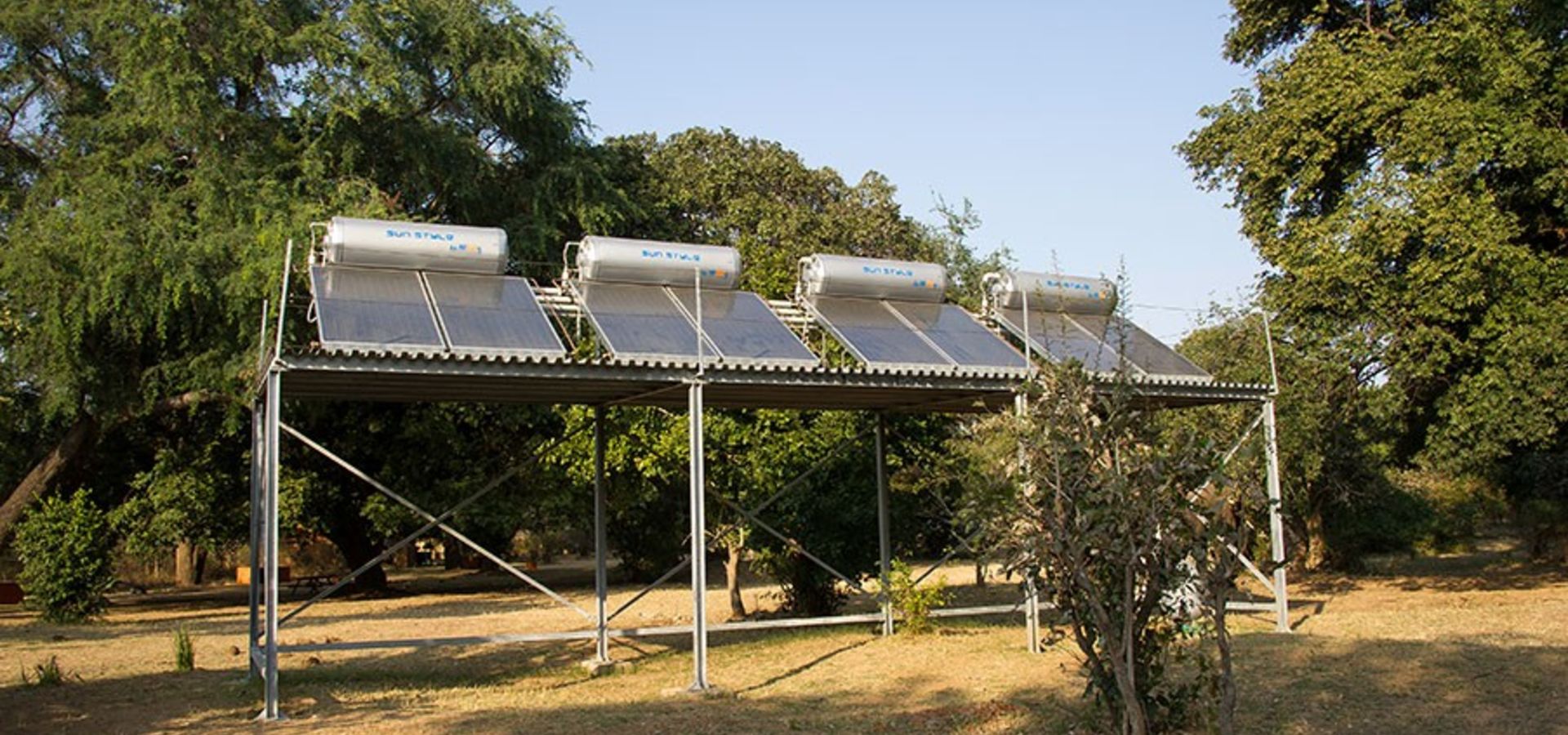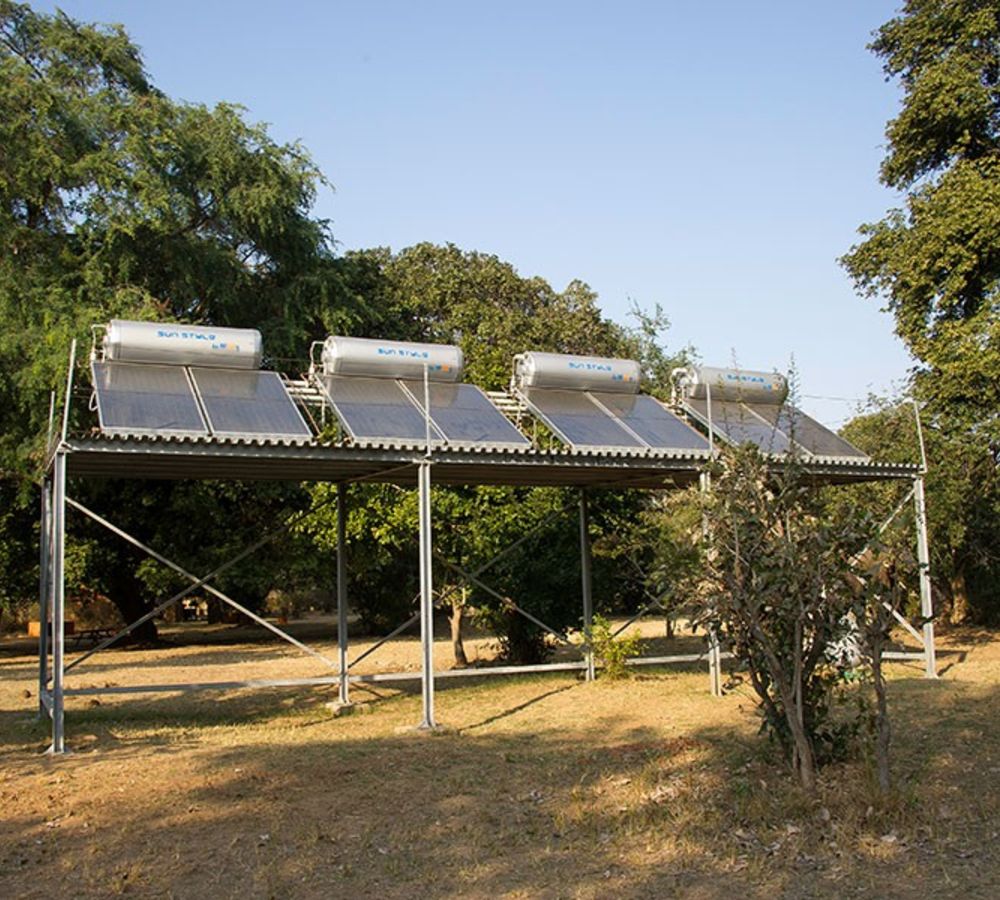



Conservation South Luangwa (CSL):
Conservation is central to our existence – we are dependent on this unique ecosystem for everything that we do. But more and more, the reverse is also true; as beneficiaries of the wildlife in the National Park, we have a responsibility to ensure that the environment remains healthy. And as a large employer, the safari industry also has the opportunity to make this happen. We support CSL and actively assist with anti-poaching and anti-snaring activities. In fact, we believe so strongly CSL’s approach to conservation, that we donate half of your Luangwa Conservation and Community Fund donations (the small charge that we add to each guest’s bill) to CSL.
Solar Power:
Our biggest and most exciting environmental project is the recent installation of a solar power system which is on top of the solar water heating system we put in some years back. Zambia and sub-Saharan Africa are struggling with the effects of climate change and as most of our power is hydro, we are at the mercy of rainfall. Our 50Kva inverter converts solar power from the 117 panels, powers camp and charges our massive 100kw battery during daylight hours. Once the sun sets the battery kicks in and is only recharged using power from the grid in off peak times. With Zambia managing loads for the rest of the year we are currently without grid power for 8 hours every day, but the sun keeps Flatdogs ticking along as if nothing has changed!
Cooking for the staff:
Traditionally, people in the local area cook in pans balanced on mopane branches and bricks. This is not only inefficient, as most of the heat escapes, but every year children are badly burned when pots of hot water fall off the fire. We worked with C - Quest Capitol and Project Luangwa to provide safer, more healthy and environmentally friendly cook stoves for local people (https://www.projectluangwa.org/programs/) and have used that design to make some bigger mud brick stoves that our staff cook, Timothy, can use to cook for our 80+ staff members. If you are interested to see them please ask Ade or Harold.
Sustainable Building Products:
We also do our bit for the environment by building from sustainable materials (all the buildings at Mfuwe Secondary are in concrete blocks rather than bricks which have to be fired using large amounts of firewood) and using threatened resources – such as mopane wood – very sparingly. We recently brought in pressure-treated gum-poles and composite decking for the Croc’s Nest from South Africa, rather than using local poles and decking made from local trees, since they dont require local trees to be cut down, damaging the fragile habitat that supports the wildlife and last much longer and are therefore better for the environment.
Tree Planting Scheme:
Working with Project Luangwa we have put together a tree planting scheme alongside the eco-stoves project. We’re hope to encourage local kids to grow up understanding the value of trees and to plant and nurture indigenous trees so that we can continue to re-stock the amazing forests that surround us and are in threat. Deforestation for firewood (or charcoal) has degraded huge areas of the Luangwa Valley and we are keen to do our bit to reverse that trend. We currently partner with the Community Resource Board (CRB) and finance their forest guard initiative, supporting local people to protect their own resources. We hope to extend this to all safari lodges in the area.
Conservation Area:
On top of the above Flatdogs has entered into an agreement with the Chief to encourage conservation locally by keeping the land adjoining Flatdogs’ boundaries as conservation areas. Fishing and development are prevented and we therefore ensure that a large patch of land along the river is protected for the sole use of wildlife. In a region where development is putting the ecosystem under increasing pressure, we are very keen to protect wildlife havens whenever possible, and give the local community some benefit financially.
Waste Water:
We are lucky to have a clean supply of water from our bore-hole that is both safe to drink, and actually tastes nice! But we are aware of the scarcity of clean drinking water in many areas so we use it responsibly – we have fitted ball-valves on as many of our water tanks as possible to prevent overflow.We also use cleaning products which are environmentally friendly and all our septic tanks now have soak-a-ways so waste water is cleaned and filtered before being returned to the soil. We have a grey-water filter to our laundry water outlet allowing the waste water to help with the growth of vegetation and not hinder it!
Waste and Recycling:
Anyone who has visited a developing country before will remember smiling at the astonishing way that people make use of everything – very little goes to waste out here! In camp, we always think about the secondary uses of all materials before throwing anything away; all ‘green’ kitchen waste goes to the garden as compost for the vegetable patch, jars are saved to store dry goods during the rainy months and plastic bottles are used to make ice blocks.
Anything that we do throw away here is at risk of being spread around the area by baboons, so we are happy that we’ve reduced this to a minimum.